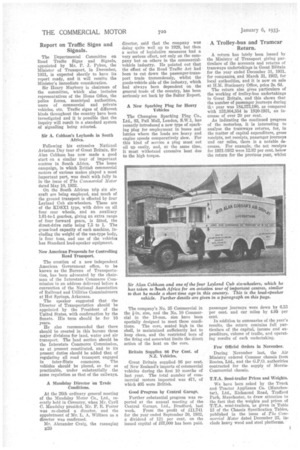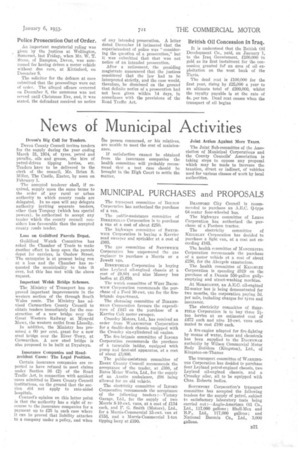Report on Traffic Signs and Signals.
Page 34

Page 35

If you've noticed an error in this article please click here to report it so we can fix it.
The Departmental Committee on Road Traffic Signs and Signals, appointed by Mr. P. J. Pybus, the Minister of Transport, in December, 1931, is expected shortly to have its report ready, and it will receive the Minister's immediate consideration.
Sir Henry Maybury is chairman of the committee, which also includes representatives of the Home Office, the police forces, municipal authorities, users of commercial and private vehicles, etc. Traffic signs of different kinds throughout the country have been investigated and it is possible that the inquiry will result in a standard system of signalling being adopted.
Sir A. Cobham's Le lands in South Africa.
Following his extensive National Aviation Day tour of Great Britain, Sir Alan Cobham has now made a good start on a similar tour of important centres in South Africa. The home campaign, in which British commercial motors of various makes played a most important part, was dealt with fully in in the issue of The Commercial Motor dated May 10, 1932.
On the South African trip six aircraft are being employed, and much of the ground transport is effected by four Leyland Cub six-wheelers. These are of the EDSX1 type, with drive on all four rear wheels, and an auxiliary 1.61-to-1 gearbox, giving an extra range of four forward gears, is fitted, the direct-drive ratio being 7.5 to 1. The gross-load capacity of each machine, including the weight of the van-type body, is four tons, and one of the vehicles has Standard loud-speaker equipment.
New American Proposals for Controlling Road Transport.
The creation of a new independent American Government office, to be known as the Bureau of Transportation, has been advocated by the chairman of the Interstate Commerce Commission in an address delivered before a convention of the National Association of Railroad and Utilities Commissioners at Hot Springs, Arkansas.
The speaker suggested that the Director of Transportation should be appointed by the President of the United States, with confirmation by the Senate. His term should be for 10 years.
He also recommended that there should be created in this bureau three major divisions for land, water and air transport. The land section should be the Interstate Commerce Commission, as at present constituted, and to its present duties should be added that of regulating all road transport engaged in inter-State commerce. The vehicles should be placed, so far as practicable, under substantially the same regulation as that of the railways.
A Mandalay Director on Trade Conditions.
At the 20th ordinary general meeting of the Meadslay Motor Co., Ltd., recently held in Coventry, when Mr. Cyril C. lfaudslay presided, Mr. F. E. Foster was re-elected a director, and the appointment of Mr. L. A. Willison as a director was confirmed.
Mr. Alexander Craig, the managing B20 director, said that the company was doing quite well up to 1929, but then a series of legislative measures had a very serious effect, not only on the company but on others in the commercialvehicle industry. He pointed out that the effect of the Road Traffic Act had been to cut down the passenger-transport trade tremendously, whilst the goods-vehicle side of the industry, which had always been dependent on the general trade of the country, has been seriously set back by the Salter Report.
A New Sparking Plug for Heavy Vehicles The Champion Sparking Plug Co., Ltd., 83, Pall Mall, London, S.W1, has recently introduced a new type of sparking plug for employment in buses and lorries where the loads are heavy and engine speeds comparatively slow. For this kind of service a plug must not oil up easily, and, at the same time, It must withstand excessive heat due to the high torque.
The company's No. 35 Commercial in the fin, size, and the No. 10 Commercial in the 18-mm. size have been specially designed to meet these condi tions. The core, seated high in the shell, is maintained sufficiently hot to keep clean, and the restricted bore of the firing end somewhat limits the direct action of the heat on the core.
Britain Supplies 86 Per Cent. of N.Z. Vehicles.
Great Britain supplied 86 per cent. of New Zealand's imports of commercial vehicles during the first 10 months of last year. The total number of commercial motors imported was fill, of which 405 were British.
Good (Progress by Central Garage.
Further substantial progress was reported at the annual meeting of the Central Garage, Ltd., Bradford, last week. From the profit of £11,741 for the year ended September 30, 1932, a dividend of 12 per cent, on the issued capital of £67,000 has been paid. A Trolley-bus and Tramcar Return.
A return has lately been issued by the Ministry of Transport giving particulars of the accounts and returns of tramways undertakings in Great Britain for the year ended December 31, 1931, for companies, and March 31, 1932, for local authorities, and it is now on sale at ELM. Stationery Office, price 2s. 6d.
The return also gives particulars of the working of trolley-bus undertakings in Great Britain, and this shows that the number of passenger journeys during th year was 184,373,190, as compared with 153,004,554 in 1930-1931, an increase of over 20 per cent.
As indicating the continued progress of the motorbus, it is interesting to analyse the tramways returns, for, in the matter of capital expenditure, gross receipts, net receipts, passenger journeys and car miles, there is a notable decrease. For example, the net receipts for 1931-1932 were 12.82 per cent, below the return for the previous year, whilst
passenger journeys were down by 6.53 per cent. and car miles by 4.9 per cent.
In addition to summaries of the year's results, the return contains full particulars of the capital, income and expenditure, Volume of traffic, and operating results of each undertaking.
Few Official Orders in November.
During November last, the Air Ministry ordered Commer chassis from Rootes, Ltd., and the G.P.O. authorities contracted for the supply of MorrisCommercial chassis.
T.T.A. Semi-trailer Prices and Weights.
We have been asked by the Truck and Tractor Appliance Co. (Manchester), Ltd., Richmond Road, Trafford Park, Manchester, to draw attention to the fact that the weights and prices of T.T.A. semi-trailers, as given in Table 13 of the Chassis Specification Tables, published in the issue of The Commercial Motor dated December 23, include heavy wood and steel platforms.
Police Prosecution Out of Order.
An important magisterial ruling was given by the justices at Wellington, , Somerset, last Friday, when Mr. W. T. Stone, of Bampton, Devon, was summoned for having driven a motor vehicle without due care, at Kittisford, on December 8.
The solicitor for the defence at once submitted that the proceedings were out of order. The alleged offence occurred on December 8, the summons was not served until Christmas Eve, and, it was stated, the defendant received no notice of any intended prosecution. A letter dated December 14 intimated that the superintendent of police was "considering the question of a prosecution," but it was submitted that that was not notice of an intended prosecution.
After a retirement, the presiding magistrate announced that the justices considered that the law had to be interpreted strictly, and the case would, therefore, be dismissed on the ground that definite notice of a prosecution had not been given within 14 days, In accor&nce with the provisions of the Road Traffic Act.
British Oil Concession in Iraq.
It is understood that the British Oil Development Co., paid, on January 1, to the Iraq Government, £100,000 in gold as its first instalment for the concession granted fof an area Of oil exploitation on the west bank of the Tigris.
The dead rent is 1100,000 for the first year, rising by £25,000 a year to an ultimate total of £200,000, whilst the royalty payable is at the rate of 45. per ton. Dead rent ceases when the transport of oil begins




























































































